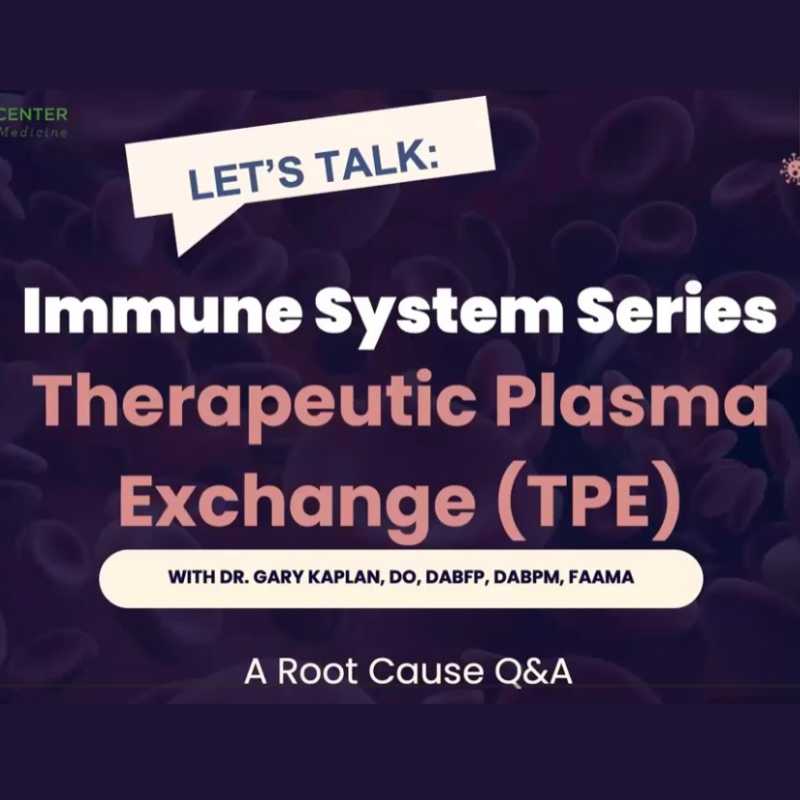
5 Ways We Can Keep Your Immune System Strong
December 10, 2025/by Kaplan Center
Want to Take Your Workout to the Next Level Next Year? These Tips Can Help
December 8, 2025/by Kaplan Center
Dr. Kaplan’s Dos and Don’ts of the Holiday Season
December 3, 2025/by Kaplan Center
Let’s Talk Webinar – A Root Cause Q&A
December 2, 2025/by Kaplan Center
Navigating Holiday Meals with Gut Issues: Simple Tips for a Comfortable Season
December 1, 2025/by Chardonée Donald, MS, CBHS, CHN, CNS, LDN
Craniosacral Therapy for TMJ | Say Goodbye to the Daily Grind
November 19, 2025/by Patricia Alomar, M.S., P.T.
From Compassionate Care to Personal Healing: A Letter to My Patients
November 18, 2025/by Kaplan Center
8 Steps to a Healthier Gut—and a Longer, Healthier Life
November 18, 2025/by Kaplan Center
Mid-Life Irritability & Fatigue Improved by Hormonal Balancing
November 13, 2025/by Lisa Lilienfield, MD
From Challenges to Change: Dr. Kaplan on Healthcare’s Biggest Challenges
October 29, 2025/by Kaplan Center
Overlooked Dangers of Mold Exposure and How to Stay Safe – Dr. Kaplan Talks to WUSA9
October 27, 2025/by Kaplan Center
Let’s ‘Fall’ Into Wellness: A Nutritionist-Approved Immune-Boosting Recipe for Cold and Flu Season
October 13, 2025/by Chardonée Donald, MS, CBHS, CHN, CNS, LDN
PANS/PANDAS – When Sudden Symptoms Signal Something More
October 9, 2025/by Kaplan Center
Beating Burnout, A Nutritionist’s Perspective
October 1, 2025/by Chardonée Donald, MS, CBHS, CHN, CNS, LDN
3 Things That Can Happen After Stopping GLP-1s
September 11, 2025/by Chardonée Donald, MS, CBHS, CHN, CNS, LDN
What Families Need to Know About COVID and Flu Season
September 3, 2025/by Kaplan Center
September is Pain Awareness Month
September 1, 2025/by Kaplan Center
Dr. Kaplan Spoke to Northern Virginia Magazine About COVID, Flu, and Immunity — Here’s What You Should Know
August 14, 2025/by Kaplan Center
“Why Do I Feel Like Crap?”: The Overlap Between Long COVID and Perimenopause
July 30, 2025/by Kaplan Center
Why People Are Turning to EMDR (and Why You Might Want to Too)
July 23, 2025/by Kaplan CenterAre you looking to improve your overall wellness?
Personalized care you can trust.
Our integrative, non-surgical treatment approach is highly successful in maintaining wellness and also treating chronic pain and illness. For more than 30 years, we have delivered superior, cutting-edge health care in the Washington, DC area.
QuickLinks
Contact Information
Tel: 703-532-4892
Fax: 703-237-3105
6829 Elm Street, Suite 300
McLean, Virginia 22101
Map It
Hours of Operation
Mon – Thu : 8 am – 5 pm, ET
Fri : 8 am – 12 pm, ET
Gentle Yoga Poses for Back, Neck and Hips
/in Wellness/by Kaplan CenterYoga is a wonderful tool to alleviate stress, which in turn can improve both your mental and physical health. Taking just a few minutes each day to gently move and stretch your body can make a big difference. Here are some gentle yoga poses to try at home.
Seated Pigeon Pose
This gentle stretch opens up the hips, glutes, and lower back.
Eagle Arms Posture
Eagle Arms helps to release tension in the head, neck and shoulders.
Runners Lunge/Yogic Lunge
Yogic Lunge opens up the hips and releases the lower back.
Seated Spinal Twist
Seated Spinal Twist gently loosens strained muscles in the back to revitalize the spine and posture.
Sun Salutations A & B with Dr. Lisa Lilienfield
/in Meditation, Wellness/by Kaplan CenterDuring stressful times I find the need for grounding, and through Yoga, I find its strength, stability, and ease to be most helpful.
Yoga (translated from Sanskrit as “to yoke”) is a moving meditation, utilizing breathing techniques called Pranayama, which we know will stimulate our parasympathetic nervous system, the opposite of fight and flight.
Here I am demonstrating 2 simple Sun Salutations, A & B, that take all your major joints through a range of motion, and warm up the musculature, with emphasis on the inhalation and the exhalation. These poses are the gateway to other standing poses.
Enjoy!
Dr. Lisa Lilienfield
Sun Salutation A
Sun Salutation B
We are here for you, and we want to help.
Our goal is to return you to optimal health as soon as possible. To schedule an appointment please call: 703-532-4892 x2
Small Choices, Big Impacts – Technology for Immune System Boosts
/in Lifestyle, Treatments, Wellness/by Jodi Brayton, LCSW“Between stimulus and response, there is a space. In that space is our power to choose our response. In our response lies our growth and our freedom.”
– Viktor Frankl
At this moment we’ve been asked to pause our lives and isolate from most of our family, friends, and colleagues. We are powerless to stop the contagion of disease or the conflict of politics but we are free to choose how we respond in this moment. And we can definitely control what sort of changes we want to see in our future selves when this time of turmoil comes to an end, as indeed it will. Though the world may seem too full of threats and too overwhelming to make any change right now, keep in mind that the biggest transformations are often the result of tiny, almost imperceptible steps we take along the way. And as every gardener knows, fallow ground is actually the most fertile because it has had time to rest and regenerate. This Spring may be just the right time to plant and nurture small seeds that will germinate and grow into the healthy changes we want to see in our lives. And the best news is that the same steps that will result in a healthier future self, will also stabilize our mood and calm our nerves leading to more equanimity in the home, as well as giving a vital boost to the immune system. Small choices that help nurture inner calm can also help bring peace to a not so peaceful world.
Be gentle with yourself
During this time of fear and uncertainty we all yearn to feel loved, nurtured, and safe. Yet the voice we often choose when speaking to ourselves — which is, after all, the person we talk to more than anyone else in the world — is neither kind nor helpful, or even truthful! Pay attention to the voice in your head and choose kind and respectful communication. In a world full of threat and danger it is important to have a sanctuary where you feel safe and calm, especially in your own mind. A small increase in self-awareness and self-compassion will lead to better self-regulation and management of emotions, which in turn will lead to more harmony and peace within. In this time of global stress, inner peace is our greatest gift and most valuable asset. Choose to nurture inner peace. Be gentle with yourself.
Technology: Immune System Boost or Bust
That little phone in our pocket (which is a million times more powerful than the computer that landed man on the moon 50 years ago) has the power to fill us with global and local news that can so overwhelm our nervous system we no longer sleep at night or even think straight. When we are so absorbed in feelings of distress that it robs us of energy and the ability to think clearly, it destroys the immune system’s ability to function at full capacity. Use technology to get absorbed in a more comfortable way of being and reconnect to the great potential that lies within.
Technology for immune system boosts:
Establish a schedule that includes lots of self-care: This profound disruption to everyday life makes it vital that we re-establish a sense of continuity. Set a firm schedule that includes appointments with yourself to get exercise, go outside, meditate, and connect with people you love even if it’s only on-line. Right now taking care of yourself is taking care of others.
Connect with people: We grow in connection with others. Reach out and let others know you’re thinking of them, they are important and you are grateful for their presence in your life. This is no time to regret things left unspoken.
Laughter: A good laugh will increase oxygen to the heart, lungs, and muscles, release endorphins in the brain to improve mood and decrease stress and elevate the immune system. That is good medicine! Contact a fun friend or watch a movie that makes you laugh.
Stories of triumph over adversity: Whether through movies, books, or chats, seek out stories where we overcome hard times. Can we get enough of these right now?
Music: Music is medicine – use it. There’s something especially touching about some of the videos musicians are putting online right now. Stripped of flashy makeup and distracting backups they feel vulnerable and powerful at the same time.
Engage the healing power of creativity: The creative process can tap into incredible inner strength and art doesn’t have to be perfect, beautiful, or significant to be powerful. One family has a nightly photography contest where the person with the most creative picture on a chosen subject gets bragging rights for a full 24 hours. That’s a great way to ease feelings of isolation!
Heart Rate Variability BioFeedback: A simple and effective way to interrupt the stress response and shift your heart, mind, and emotions into healthy coherence, you can use Inner Balance technology to replenish your energy, balance your emotions, and increase resilience. Buy the Inner Balance device here at The Kaplan Center or go to HeartMath.com for this fun and efficient bio-hack to your meditation practice.
Gratitude journal: Relishing good experiences can improve health, outlook, and relationships. A definite boost to the immune system!
Expressive writing: A form of therapy that can be good for your sleep, your state of mind, and your emotional well-being, all of which bolster your immune system and improve your health. Click here for instructions on this powerful technique.
Benefit finding: Finding the silver lining in a dark cloud can be a potent boost to the immune system. Then taking the time to write these thoughts is like doubling down on a good bet.
Random acts of kindness: Nothing makes us happier than to know we’ve touched someone’s life in a positive way. There are many lonely people out there. Reach out and do something kind. It will boost your health and make them feel better.
Pit stop reminders: Fear, uncertainty, and helplessness can rev the nervous system like a race car so schedule regular pit stops to refuel and make mechanical adjustments so you can stay in it for the long haul. Set a timer that goes off every two hours and stop, stretch, do a minute of deep breathing, and drink water to hydrate. Small steps are giant leaps when it comes to countering fear and balancing the nervous system.
Guided Imagery and Self-Hypnosis: Tap into the tremendous power of your own mind to relieve stress, relax your body, improve sleep, and elevate immune system functions. The health benefits are numerous and there are no risks or side effects. You can explore different imageries on-line or call for an in-person or video conference appointment at The Kaplan Center.
Or… turn off all technology
Use this opportunity to find the beauty in small things and contemplate what is really important in life. Better days are ahead. In the meantime, be gentle with yourself, use technology wisely and find ways to control what you can in order to ease the feelings of helplessness and reconnect with the potential that exists within you.
We are here for you at The Kaplan Center. Call to schedule an appointment in person or on-line with the doctors and therapists that can help you get through this change with as much health and resilience as possible. We very much look forward to seeing you.
We are here for you, and we want to help.
Our goal is to return you to optimal health as soon as possible. To schedule an appointment please call: 703-532-4892 x2